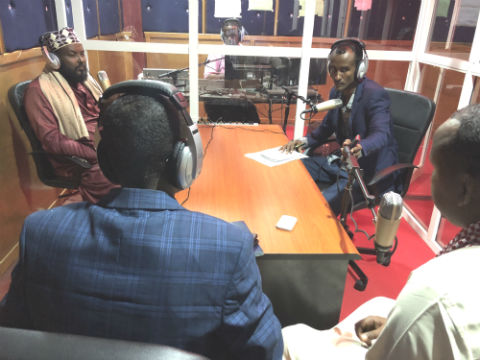Youth participation in politics and peace building efforts is increasing in Somalia following a series of live radio talk shows, which have been ongoing in Jubaland and south west states of Somalia since May 2018. The youth peer education network (Y-Peer) in Somalia is promoting youth engagement activities under the United Nations Peace Building Fund (PBF) being managed by UNFPA Somalia and UN Habitat Somalia.
“The Y- Peer network entered into partnership with media stations in the target areas to air a series of live talk shows and engage the young people through phone-ins on various topics focused on youth political participation and peacebuilding in Baidoa, Kismayo and Dolow districts,” said Mohamed Arshad, executive director Y-Peer.
He said radio is the primary source of information in Somalia and plays a crucial role in shaping audience perception. “The objective of the live radio talk shows was to provide a safe platform for the youth in the three targeted districts to debate on pertinent political and peacebuilding issues in their areas and build a consensus for youth action,” said Arshad.
Design of the radio shows
Each of the FM radio stations was contracted to air and host four live talk shows and phone-ins for a period of one month. Each of the four shows was aired twice per week. The programs were advertised at least two days before the actual airing date to attract increased listenership and attain robust engagement in the form of phone calls.
“The topics and design of the programs were jointly prepared by the radio journalists as well as UNFPA and Y-Peer Somalia staff to ensure effective communication with target audiences,” said Arshad.
He explained that the target audience for every show was 2,500 listeners. “But due to the popularity of the FM stations, the number is believed to have been much higher,” Arshad said.
Some of the interesting topics under discussion were inter-generational dialogue between elders and youthful panelists on perspectives of inclusion in a democratic space and the assessment of the capacity of youth organizations in Somalia.

the radio shows are growing in popularity
Key Voices
In one of the programs, youth organization representatives from Kismayo were engaged in a live debate to assess the extent of youth inclusion in Jubaland’s political and peacebuilding processes. Whereas the panelists expressed diverging opinions on the level of youth participation in politics and peacebuilding, they unanimously agreed that there is a need for constant awareness creation by both governmental and non-governmental actors on the role of the youth in rebuilding Somalia. One of the panelists stated that the youth lack the confidence to engage in meaningful political processes because they do not have the theoretical knowledge of the discipline and have had no support from older politicians and government institutions. Other youths in Kismayo participated in the program through phone calls and texts, expressing their appreciation for the program and requesting for sustained youth programming to allow young people from around Jubaland to exchange views and create solidarity. Inspirational youth songs were played intermittently during the programs to reinforce the messages and attract increased internship.
In Baidoa, two prominent elders and two youth organization representatives were invited to a live talk-show by Mustaqbal FM radio to engage in an inter-generational dialogue on the perspective of youth inclusion in the democratic space.
After an exciting debate between the two sides and engagement with listeners through phone calls and texts, the elders agreed that the youth should be robustly engaged in the region’s politics and peacebuilding processes, but in their defense, they challenged the Somali youth to increase their capacity to manage societal affairs and prove that they are capable partners in the state building processes.
The youth panelists and listeners argued that the youths are the fodder for the conflict in Somalia since they serve as clan militiamen, Al Shabaab fighters and government troops but are rarely engaged in peacebuilding. They called for a paradigm shift to allow the youth to transition from being the fodder for war to peacemakers.
Other topics discussed in separate programs included the outlining of youth priorities on peace and state-building processes and the harnessing youth social movements for policy change. The feedback of the programs was overwhelmingly positive and the youthful panelists expressed their increased confidence after participating in the talk-shows. They pledged to continue engaging with the older politicians, clan elders and the local media to promote the acceptance of youths as competent and resourceful partners in politics and peacebuilding processes.
Since inception, the radio program on Mustaqbal FM radio alone has registered 620 call-ins with informative arguments and 96 panelists appearing in series discussions. The program has reached over 5,000 listeners in project locations of Kismayo, Baidoa and Dolow.
The United Nations Peace Building Fund project being managed by UNFPA Somalia and UNHABITAT and implemented by Y-Peer Somalia will continue to engage the youths in the three targeted districts of Dolow, Kismayo and Baidoa, according to UNFPA Somalia Programme Analyst-Youth Fatuma Muhumed.
“This will be done through a raft of other methodologies including capacity building programs, convening of youth forums, blogging competitions and supporting the ministries of youth empowerment,” said Muhumed.
- Fatuma Kuno Muhumed
-------------------------------------------------------
For more information please contact UNFPA Somalia Communications, Partnerships & Donor Relations Specialist Pilirani Semu-Banda on e-mail: semu-banda@unfpa.org


